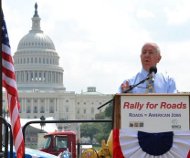3/21/2012
US Senate Leads on Transportation BillSenate takes the lead is setting US transportation policies.

By a 74-22 vote, the US Senate last Wednesday passed a massive $109 billion bill reauthorizing federal transportation programs for eighteen months. Passage gives a significant advantage to supporters of mass transit and offers mixed results for those seeking to convert freeways into toll roads.
The Democrat-controlled upper chamber's legislation sets a number of priorities that conflict with those found in the Republican-controlled House version. House Speaker John A. Boehner (R-Ohio) has thus far failed to secure a majority for the lower chamber's vision of stopping the forced diversion of motorist gasoline tax funds into rail projects that benefit those who do not drive.
Environment and Public Works Committee Chairman Barbara Boxer (D-California) celebrated her advantage at a rally yesterday with various road-building interest groups to prod the House to take up the Senate legislation, which is 25 percent more expensive than the House bill.
"This is not the time to quibble," Boxer said. "This is not the time to stall. This is not the time to reinvent the wheel. This is the time to act across party lines together.... I hope, and to be honest, I pray, that Speaker Boehner works with Minority Leader Pelosi to get this done."
Known as MAP-21, the Senate bill increases "TIFIA" subsidies for toll roads to $1 billion, with Uncle Sam picking up up to 49 percent of the tab for any private project imposing tolls on drivers. Senator Kay Bailey Hutchison (R-Texas) agreed to preserve the status quo by dropping her amendment that would have limited the number of interstate freeways that could be converted into toll roads from the present three to just two.
Tolling suffered a setback, however, from two adopted amendments crafted by Senator Jeff Bingaman (D-New Mexico). The first removes any tolled highway from the lane-mile calculation used to apportion federal highway funds. In effect, states would receive less money if they chose to implement "privatized highways."
Bingaman also authored a highly technical change in the tax laws to eliminate favorable treatment for long-term highway leases. The current code allows leased infrastructure assets to be depreciated over 15 years, even if the asset is leased for 75 or 90 years. Bingaman's language sets the depreciation at 45 years, matching the government's official estimate of the useful life of a highway asset. The net effect is to reduce the taxpayer subsidy of the private companies that operate toll roads.
The private companies that operate red light cameras and speed cameras are poised to win big if the Senate language prevails. The House had included a prohibition on the use of federal highway safety funds for automated ticketing machines. The Senate includes no such prohibition and even opens the door to more taxpayer funding with a provision allowing the use of environmental funding for "automated enforcement."
Current transportation programs will expire at the end of the month unless this bill or a temporary extension is signed into law.


